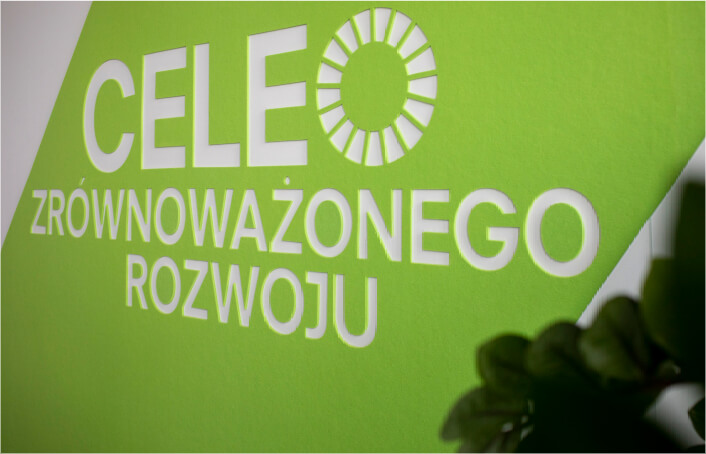ESG MANAGEMENT


ESG in the BNP Paribas Bank Polska Group
BNP Paribas Bank Polska S.A is an organisation aware of its impact on its environment and approaching the management of ESG (E-environment, S-social, G-governance) aspects in a responsible and comprehensive manner. Maintaining its position as a leader in sustainable finance is one of the Bank’s key commitments under the GObeyond strategy for 2022-2025, and \ environmental, social and corporate governance concerns are an integral part of it. This is the Bank’s first business strategy fully integrated with an ESG strategy.
Overseeing the implementation of strategic objectives from the area of sustainable development is the responsibility of the Executive Director of the Sustainability Area, Chief Sustainability Officer (CSO), reporting directly to the CEO.
Sustainability issues are of interest to the Supervisory Board which oversees the Bank’s activities, including the implementation of the sustainability strategy, which is implemented by the Bank’s Management Board as the main governing body of BNP Paribas Bank Polska S.A. There are Supervisory Board committees with decision-making powers on specific aspects deemed to be related to, among other things, sustainable development.
We have started preparing a business strategy for the next period. Taking stakeholders’ interests and viewpoints into account when defining the Group’s strategy strengthens the relationship of trust. This approach will continue when defining the next strategic plans.
The 2024 report provides comprehensive information on managing the Group’s impacts, risks and opportunities through specific activities, metrics and targets. The Group’s dual materiality analysis identified the following as important issues: climate change (ESRS E1), own workforce (ESRS S1), consumers and end-users (ESRS S4), business conduct (ESRS G1), as well as two topics specific to the Group: market integrity and financial security, and cybersecurity. The Sustainability Statement covers the Group’s entire value chain.
Sustainable financing
The role of responsible financial institutions is to develop products and services with a positive impact, responding to global challenges and local market conditions, and to limit financing that is not in line with this direction. The Bank’s sustainable product offering supports environmentally and socially responsible investments or activities and contributes to the Sustainable Development Goals (SDGs).

The value of sustainable financing as at the end 2024 was PLN 10.2 billion, which constitutes 11.6% of the total financing.
| Value of sustainable financing |
Value (PLN million) |
||
|---|---|---|---|
| 2023 | 2024 | change y/y | |
| with a positive environmental impact | 6,553 | 6,353 | (3.1%) |
| with a positive social impact | 565 | 471 | (16.6%) |
| ESG Rating-Linked Loan | 340 | 468 | 37.6% |
| Sustainability-Linked Loan | 2,141 | 2,866 | 33.9% |
| TOTAL | 9,599 | 10,158 | 5.8% |
| Financing with a positive environmental impact |
Value (PLN million) |
||
|---|---|---|---|
| 2023 | 2024 | change y/y | |
| renewable energy | 1,870 | 1,500 | (19.8%) |
| green building | 2,441 | 2,727 | 11.7% |
| thermo-modernisation of buildings | 1,322 | 1,220 | (7.7%) |
| improving the energy efficiency of production processes | 130 | 151 | 16.2% |
| low-carbon transport | 225 | 108 | (52.0%) |
| closed-loop economy | 251 | 212 | (15.5%) |
| waste and water treatment | 95 | 237 | 149.5% |
| natural resources and biodiversity | 219 | 198 | (9.6%) |
| TOTAL | 6,553 | 6,353 | (3.1%) |
| Financing with a positive social impact |
Value (PLN million) |
||
|---|---|---|---|
| 2023 | 2024 | change y/y | |
| counteracting social exclusion | 2 | 4 | 100.0% |
| healthcare | 416 | 349 | (16,1%) |
| education | 121 | 75 | (38.0%) |
| basic infrastructure (e.g., water supply, sewage system) | 26 | 43 | 65.4% |
| TOTAL | 565 | 471 | (16.6%) |

Responsibility towards the natural environment is one of the commitments of BNP Paribas under the POSITIVE pillar of the GObeyond strategy for 2022-2025. For many years, we have been involved in counteracting climate change and minimising its effects and, we have been implementing solutions to reduce greenhouse gas emissions from our own activities. The Bank of Green Changes programme aggregates all of the organisation’s initiatives for the natural environment.
The Bank of Green Changes programme includes:
- ESG monitoring of Customers and investments and implementation of CSR policies, with a particular focus on decarbonisation processes,
- continuous development of the range of products and services that support our Customers in the transition to a low-carbon economy and green investments,
- real changes in the way the organisation operates to minimise the negative impact of its operations on the natural environment,
- educational activities aimed at employees from all areas of the Bank and external stakeholders, building partnerships and supporting pro-environmental initiatives,
- since 2024, the Bank has been monitoring the emission intensity of loan portfolios in carbon-intensive sectors.
-
Hybrid and electric cars in the fleet
-
823
2023
-
1,061
2024
-
-
Electricity utilised by the Bank from renewable sources
-
100 %
2023
-
100 %
2024
-
Selected environmental indicators
| 2023 | 2024 | change y/y | ||
|---|---|---|---|---|
|
|
Group greenhouse gas emissions generated from operations (tons CO2e market based)1 | 10,144 | 8,280 | (18.4%) |
| Group greenhouse gas emissions scope 3 category 15 (tons CO2e)2 | – | 4,701,774 | no change | |
| Hybrid and electric cars in the fleet | 823 | 1,061 | 28.9% | |
| Electricity utilised by the Bank from renewable sources | 100% | 100% | no change | |
- the value includes category 6, scope 3
- the value excludes treasury bond issues and scope 3 Customers, see report for more information
At BNP Paribas Bank Polska, we actively contribute to society – our employees, Customers and local communities. The Bank is convinced that a committed and satisfied employee guarantees a high level of customer satisfaction. Hence, it is crucial to us to create an environment that supports the development of employees, their activity, and creativity, but also gives enough space for errors resulting from testing bold, non-standard solutions. For this purpose, the Bank is promoting the values of empowerment, cooperation, courage, simplicity and transparency among its employees. Applying these in our daily work will enable us to respond dynamically to changing market conditions and will contribute to the successful implementation of our strategic ambitions. We are committed to ensuring that all employees feel valued and have the same opportunity for personal development. Communication with our employees is based on honesty, respect and acting in accordance with ethical standards.
In addition, we constantly strive to make our products and services more accessible to groups at risk of social exclusion. We are open to the needs of our Customers. We promote philanthropic projects for social equality. We take initiatives for the benefit of local communities. We develop our initiatives above all where we can make a real contribution to positive change.
-
Number of training hours – average per person employed by the Bank in a given year
-
26.3
2023
-
27.9
2024
-
-
Number of Clients’ centres with the “Barrier-free Facility” certificate
-
131
2023
-
143
2024
-
Selected social indicators
Bank data, unless otherwise indicated.
| 2023 | 2024 | change y/y | |||
|---|---|---|---|---|---|
|
|
The Group’s headcount (active employees)3 | 7,740 | 7,512 | (2.9%) | |
| Number of training hours – average per person employed by the Bank in a given year | 26.3 | 27.9 | 6.1% | ||
| Adjusted Gender Pay Gap4 | 6.24% | 3.80% | (2.44 p.p.) | ||
| Percentage of women in the Management Board of the Bank in a given year | 22.2% | 37.5% | 15.3 p.p. | ||
| Percentage of women in top management (B1+B2) in the Bank and the Group5 | 46% | 46% | no change | ||
|
|
Number of the Bank’s volunteers involved in the Szlachetna Paczka (Noble Gift) initiative in a given year | 2,223 | 2,740 | 23.3% | |
| Number of Local Ambassadors of the Bank operating throughout Poland | 140 | 160 | 14.3% | ||
| Number of donors under the “Wspieram caly rok” (I support all year long) programme | 397 | 408 | 2.8% | ||
| Number of Customer Centres with the “Barrier-Free Facility” certificate | 131 | 143 | 9.2% | ||
- change in data presentation from 2024 onwards to active employees, an agreement was reached with the Trade Unions in December 2020 and a redundancy programme for 2021-2023 was announced, the Bank also launched a Voluntary Redundancy Programme
- unadjusted Gender Pay Gap is presented in the report, in ESRS S1-16
- as a result of the reassignment of the number of employees to the structure by Board of Directors, Top Management (B1 + B2), Lower Management, Other Employees, the approach to the presentation of the indicator on the percentage of women in management positions was changed
Responsible corporate governance is the foundation of all our activities. We implement the best market practices in this regard and adhere to the highest standards of ethics and responsibility. A key document from the perspective of ESG management at BNP Paribas is the Code of Conduct of the BNP Paribas Group. The Bank is also one of the initiators of The Declaration of Responsible Selling, which aims to raise and disseminate ethical standards in Customer relations, educate business and consumers, increase trust in the financial sector and counteract unfair practices. This section of the Sustainability Report outlines the Group’s policies, including those relating to anti-corruption, as well as other compliance risk issues (financial security, market integrity). Measures to mitigate business risks and other compliance risk issues are also described.
The following indicators have been adopted for governance and other topics related to compliance risk:
- percentage of persons in positions most at risk of corruption covered by training programmes on corruption and bribery;
- number of convictions and penalties for violations of anti-corruption legislation.
As a responsible financial institution, BNP Paribas monitors the level of ESG risks of all its Business Customers. We also pay particular attention to the financing of sectors considered sensitive in terms of ESG risks.
-
Value of sustainable financing (PLN billion)
-
9.6
PLN million
2023
-
10.2
PLN million
2024
-
-
Number of CSR Analyses carried out during the year
-
273
2023
-
251
2024
-
Selected economic indicators
| 2023 | 2024 | change y/y | ||
|---|---|---|---|---|
|
|
Number of CSR Analyses carried out during the year | 273 | 251 | (8.1%) |
| Value of sustainable financing (PLN billion)6 | 9.6 | 10.2 | 6.3% | |
| Number of employees participating in the “Conduct Journey” training on conduct7 | – | 7,119 | – | |
| Number of most exposed employees participating in the anti-bribery and anti-corruption training7 | – | 493 | – | |
- total balanced loans and advances (portfolio measured at amortised cost)
- data presented in the report since 2024
